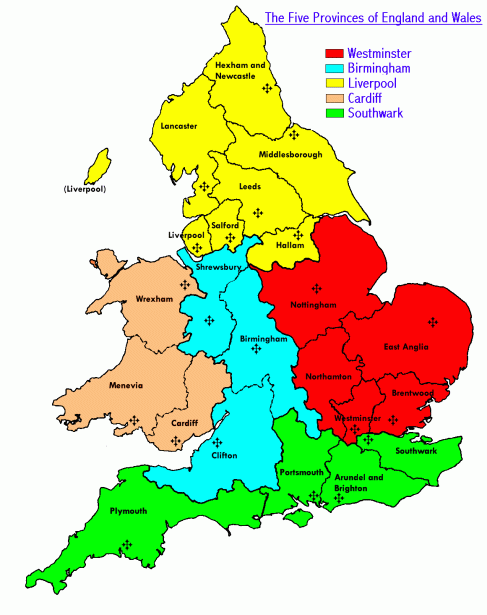At the end of the pre-Viking period of Anglo-Saxon history, before the unified kingdom of the English was forged by Alfred and his heirs, four kingdoms remained standing. These were Northumbria, Mercia, East Anglia and Wessex (which by then included Kent). Later these former kingdoms would possess Ealdormen in the unified kingdom up to the Conquest. These Kingdoms broadly correspond to the Provinces of England in the present hierarchy of the Church. Interestingly, each of the Archbishops today corresponds to a former Metropolitan See prior to the Völkerwanderung and the Reformation. London seems to have been a metropolitan see prior to the Anglo-Saxons and it was here that St Gregory intended to re-establish the principle see of Southern England. Instead, as the foremost Anglo-Saxon ruler of the day was the king of Kent and St Augustine died in Canterbury, a new Metropolitan See of Canterbury was established. Westminster and Southwark succeed to these two sees. York too was almost certainly a Metropolitan See under the Romans and Gregory intended its restoration by his mission. York was restored by St Paulinus and became a Metropolitan See once again under Ecgbert in the eighth century. In 787 King Offa of Mercia managed through flattery and pressure to have Lichfield, the See of St Chad, elevated to a Archdiocese at Canterbury’s expense creating a province extending from the Thames to the Humber. The innovation lasted a mere sixteen years. Nevertheless, Birmingham now succeeds to the Mercian part of the fleeting jurisdiction of Lichfield and the relics of St Chad repose in Birmingham Cathedral. These seem very dark times and perhaps only persecution and glorious martyrdom await the faithful before the end, but there may be some reason to hope that the visions of St Paul of the Cross, Blessed Dominic, St John Vianney and St John Bosco could be fulfilled and to plan for a third spring. So here is a nice video of Lichfield Cathedral for Brummie Catholics to meditate upon for future reference (with a nice non-conformist hymn to remind us that the English have always instinctively rejected the Anglican abomination).

March 11, 2013 at 11:42 am
This great hymn ,can now be sung by Anglican use catholics. As for your term “the Anglican abomination” i think that a great many faithful Anglicans would shirk at that ,but many more would agree seeing as there is a spirit of accomodation in the greater part of the Anglican Church- here in oz as well as im the UK.
I am sure that if JCRyle Bishop of Liverpool -who once said that Our Church is the Anti Christ- came back he would see where the anti Christ was morelikely to take root and cross the Tiber away from Canterbury.
March 11, 2013 at 7:11 pm
I called it an abomination because by its nature the ‘Church of England’ surrenders to the state the offices of teaching and governing and abandons (on account of the invalidity of its orders) the office of sanctification. It sets up the standard of Caesar in the holy place and exhorts us to worship his image. It seems as if non-conformists reject the ‘Church of England’ because they feel that Caesar cannot be the oracle of truth and so they must look elsewhere for the Gospel. In this respect it seems a non-conformist has far more chance of being a merely material heretic than an Anglican.
March 13, 2013 at 9:47 am
I agree my point was the godly Anglicans out here .However the Anglican church in Australia-not a State Church – was associated with the Establishment whilst the Catholic church was with the working class and immigrants
March 13, 2013 at 9:54 am
Sorry got interrupted ,i should have said after out here that many Amglcians I know have a distaste for any sense of being part of the Establishment-thes ebeing mainly Low Church . However who offers their cathedral here in Melbourne for the State Funerals of notables such as Rupert Murdoch’s mother ?-The Anglicans,thus seeking to maintain their Establishment ties?